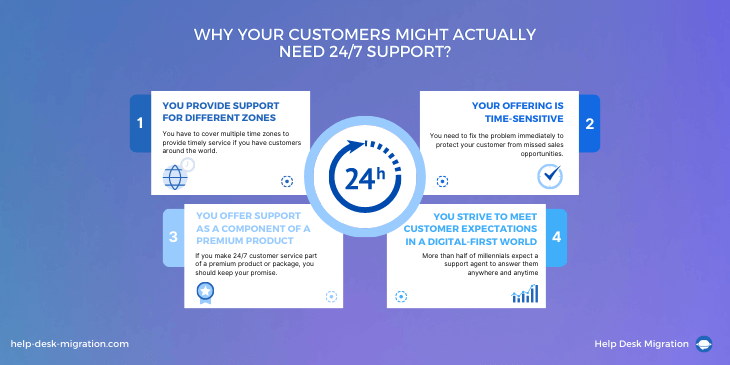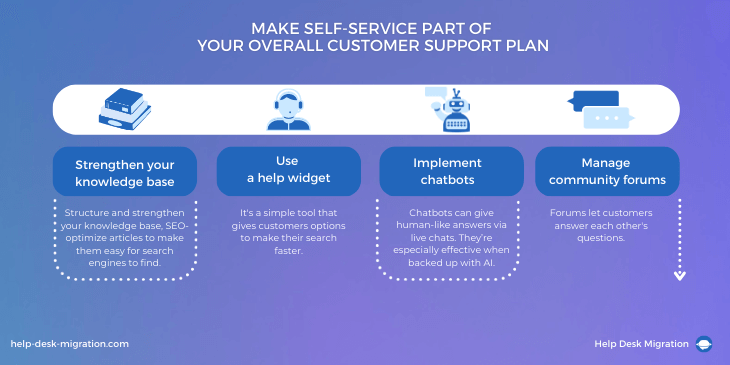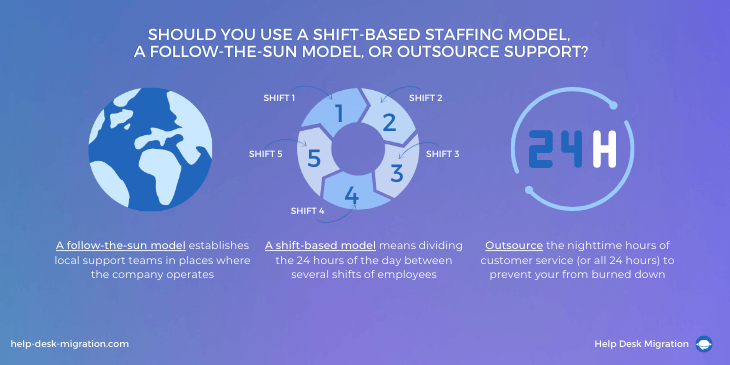A whopping 58% of millennials expect to be able to engage with brands anytime and anywhere, and most believe that a quick response is crucial for good customer service. How can companies meet those customer expectations? With 24/7 customer service.
If you aren't sure what around-the-clock support entails or how to choose your resources wisely to both meet customer expectations and optimize your profit, read on. We'll provide you with all the information you need to build a top-notch support department. But let's start with the basics.
What Does 24/7 Customer Service Mean?
24/7 support means that a customer can find answers to their questions or address their issues any time of the day or night. Thanks to state-of-the-art customer support platforms, around-the-clock customer service doesn't necessarily require a human agent to explain every detail, step-by-step. Before the support team steps in, customers have access to chatbots, AI-based voice assistants, a knowledge base, and other useful tools.
But before we dig deeper into how to ensure around-the-clock service, let’s consider another important question: Do you even need to provide 24/7 support service?
How to Know If Your Business Needs to Provide 24/7 Support
24/7 customer service isn't invariably a beneficial choice for all companies. Setting it up takes time, managerial effort, and money, but will it even satisfy your customer expectations? In other words, what if your customers just don't need phone or chat support around the clock, and you invest too much in these options?
So, let's explore why your customers might actually need 24/7 support.
You provide support for different zones
If active hours for your customers differ, for example, if you work in the USA and serve customers on the east and the west coasts, you have to cover multiple time zones to provide timely service.
Your offering is time-sensitive
Sometimes, even an hour's delay can cost you and your customer a fortune. Suppose you're a server provider. If your customer—an online shop—has server issues on Black Friday, their buyers won’t reach the online catalog and won’t spend their money there. You need to fix the problem immediately to protect your customer from missed sales opportunities, or risk losing your customer.
You offer support as a component of a premium product
If you make 24/7 customer service part of a premium product or package, you should keep your promise. But before including it in the package, first, make sure that your customers need this feature. Otherwise, your support reps working night shifts might sit there with nothing to do.
You strive to meet customer expectations in a digital-first world
While two-thirds of customers expect an answer within 10 minutes, and more than half of millennials expect a support agent to answer them anywhere and anytime. This means they expect 24/7 customer service. If your research shows that your customers are among these percentages, you’ll want to meet those customer expectations.

If at least one of these reasons we listed rings a bell for you, get ready to build a 24/7 support workflow. But if you still have lingering doubts, here’s a list of benefits of around-the-clock support for you to consider.
Why 24/7 Support Is Important for Businesses?
Basically, all business advantages of 24/7 customer service boil down to one main benefit—more satisfied clients. Here’s why:
- It ensures better customer experiences. Faster service equals better customer experience. In fact, 90% of consumers surveyed by HubSpot believed an immediate response is important or very important when they have support questions.
- It reduces customer effort scores (CES.) Everyone prefers simple rather than complicated. When a company responds immediately, CES drops because customers have their answers with a few clicks.
When customers know they can access reliable support service at any time, they don't engage with competitors (assuming of course, that your product is as good as your service.)
Moreover, they suggest your products and services to friends, colleagues, and even social media followers without any incentives from you. According to statistics, customers who rate a company’s service as good are 38% more likely to recommend that company, which increases the number of loyal and potential customers. Here’s how 24/7 support increases customer loyalty and brand awareness.
Are you wondering how you can reach this excellence? Use these tips.
Tips for Providing 24/7 Customer Service
If you want to achieve excellent around-the-clock service, the first major task is to analyze customer feedback and other data to learn your customers' needs. For example, you can define preferred channels of communication, peak hours for requests, language and cultural concerns, and so on. This isn't a one-day job, but it’s vital. Using the data you collect, you can define your customer’s journey and expected service levels and build your services accordingly.
And keep in mind that 24/7 customer service is not only about human agents managing customer queries, but it’s about multiple self-service options. And we have recommendations for managing both elements.
Suggestions to set up your self-service elements
Self-service customer support elements offer at least two benefits—fewer tasks for employees and more satisfied clients, as 69% of the customers prefer to solve their issues independently. So make self-service part of your overall customer support plan.
Strengthen your knowledge base
A knowledge base is a collection of how-to articles and guides. It lets your customers find solutions for common issues and questions. Here are three things to keep in mind if you want to make their searches easier:
- Structure and strengthen your knowledge base, add tags, and SEO-optimize articles to make them easy for search engines to find.
- Periodically review and update your knowledge base with relevant data.
- Add an option for customers to provide feedback on articles so you know whether customers found them helpful.
These suggestions will help ensure that your customers can find solutions and answers within minutes.
Use a help widget
A help widget is another way to make self-service more convenient. It's a simple tool that gives customers options to make their search faster. For example, it can include a search engine to find a needed article or a form to leave a support request.
Implement chatbots
Chatbots can give human-like answers via live chats. They’re especially effective when backed up with AI. For example, when a customer formulates a question in words other than tags, AI recognizes synonyms and presents the right solutions in a live chat.
Manage community forums
Forums are another way to solve issues without phone or chat support from representatives because they let customers answer each other's questions. But to make forums effective, support reps should regularly check discussions and answer forum questions that have been left without a response. Finding answers in forums can be as effective and as fast as finding answers in a knowledge base.

Suggestions to adapt your support team’s workflow to your customers’ needs
Alas, self-service options cannot answer every customer question, so you need to build a top-notch support team to cover queries 24/7 via live chats, emails, or phone. To build an efficient team, use the following advice.
Use multiple channels matched to the appropriate average response time
If your customers are open to using all communication channels, you should be too. But, if some channels are not needed, you can cut spending by skipping those integrations.
The same goes for times when your customers contact support the most—increase staffing during peak hours and schedule fewer agents when you expect lower workloads.
In addition, you can define a different average response time metric for each support request type, which allows you to prioritize and queue tickets appropriately.
Adopt the most appropriate staffing model to cover the workload for 24/7 support
Should you use a shift-based staffing model, a follow-the-sun model, or outsource support? The nuances of your organization and your customers’ needs will dictate which model best suits 24/7 customer service for your business.
A shift-based model means dividing the 24 hours of the day between several shifts of employees.
A follow-the-sun model establishes local support teams in places where the company operates, to cover the regular work-day hours for that location.
Another option is to outsource the nighttime hours of customer service (or all 24 hours) so your employees don’t get burned out from working too many night shifts. Outsourcing can also cost less.
You need to analyze the pros and cons of each model carefully to choose the one that best fits your needs.

Use automated customer service to optimize support operations
Regardless of which scheduling model you choose, you can optimize support operations with the right software. How? Software with automated customer service tools lets agents complete tasks in less time and with less effort, improving their performance. Simply by virtue of automating workflows, you can hire fewer support specialists, increase retention rates, and speed up customer service.
For example, help desk software automates workflows by routing tickets to suitable agents. It can prioritize requests by the level of importance, show a detailed history of customer interactions, and provide email templates.
Instead of your agents having to manually select from several tabs or apps to find the information they need and waste time combining information from different sources, an automated customer support platform provides agents with everything they need so they can find the right solutions quickly.
Set up agent-facing AI to assist agents
Even though support reps have all the information about customers' problems at their fingertips, they might face challenges finding the right solution. AI-based customer support platforms easily solve this issue. AI platforms have all the necessary data and can analyze requests to find the best possible answer. The support agent checks the answer AI selects, and if it fits, provides the solution to the customer.
These tips can help you build a robust support department for your company. All you need to do is to choose the right help desk software, track its performance, and optimize it over time. Next, we’ll suggest a few free customer support platforms.
Best Free Help Desk Platforms for 24/7 Customer Support
Many help desks have free packages that might fit your requirements. It's often best to try the free options first, to make sure the customer service software will meet your needs, and then you can purchase their advanced features later.
- Jira Service Management—a great help desk for escalation and incident management
- LiveAgent—an ideal software package to manage requests from multiple communications channels, with built-in live chat and hundreds of advanced features
- Zoho Desk—a perfect tool to easily track, prioritize, and close tickets from multiple communication channels
- HubSpot Service Hub—an excellent ticketing tool with multiple advanced features, like team email, knowledge base, and feedback analysis (some of these are paid)
- Freshdesk—good software for larger teams, especially call centers, to automate workflows
- Spiceworks—an ideal tool for IT support teams managing more than one customer per agent at once
- osTicket—a simple help desk software program with ticket routing features and dashboard reports
Whatever help desk software you choose, you’ll face another concern: How do you migrate data to a new platform? Data migration can be nerve-wracking and time-consuming, but the right software makes it easy. Help Desk Migration will help you import your data to HelpDesk, Zendesk, Zoho Desk or any other platform without hassle, keeping all records safe and intact. Try a Free Demo to see how Help Desk Migration’s capabilities can benefit your business.
Final Thoughts
More and more businesses need 24/7 customer service to meet modern customer expectations. Meeting customer expectations helps you attract more business, increase customer loyalty, and increase brand awareness. But only if around-the-clock support service is what your customers really need. Otherwise, you can waste time and money mimicking other companies.
Still, you can benefit from 24/7 customer service if a careful analysis of your customers’ needs and behavior correlates with the perks of 24/7 support. Providing around-the-clock support requires using software instead of human agents to communicate with customers whenever possible, optimizing support operations, and helping support teams perform their work more effectively. Around-the clock-customer support is great, but what’s even better is providing excellent service with an appropriate average response time within a reasonable budget.


